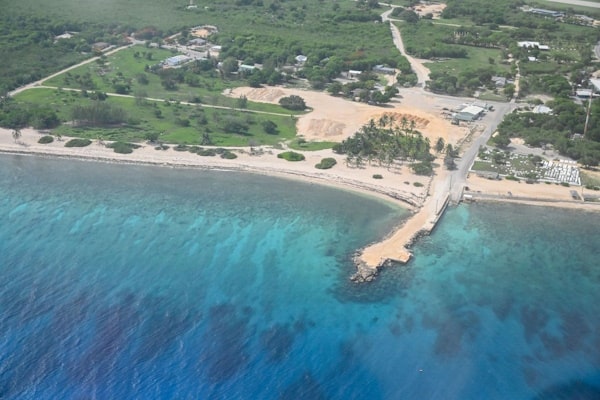Tackling poverty through micro-loans
J. A. Roy Bodden writes: I have long advocated that the most practical and risk-free solution to assisting the poor in the Cayman Islands is the establishment of a system of micro-industries modelled on what Muhammad Yunus has done in Bangladesh. In this model, borrowers are advanced small sums of up to $5,000 to set up cottage industries such as producing jams, jellies and other preserves, investing in small agri-industry projects, and the making of uniforms for schools and the uniformed services.
The strength of this organisation is that the loan holders are organised into support groups based upon the principles established in Alcoholics Anonymous and other similar self-help groups. At these meetings, the clients discuss challenges experienced and support one another by crafting strategies to overcome the challenges. Today, the Grameen Bank is the only bank in the world with a loan repayment rate of over ninety-eight per cent.
I have detailed this strategy in my book, From Guard House to the Glass House, including showing correspondence I held with then-Governor John Owen on how finance for such a venture could be accessed. I also recall suggesting the matter to my then-UDP colleagues. At that time Muhammad Yunus was in Jamaica and I suggested that the Caymanian officialdom seek an audience with him in an effort to explore the possibility of setting up micro-industry financing in these islands. Regrettably, my suggestion was not taken. And the rest, they say, is history.
I also believe that we have wasted another glorious opportunity by not establishing a Sovereign Wealth Fund. This could have reasonably been achieved during all those years when the islands were awash in money. Just imagine how well off we would have been now if a few million dollars were consistently tucked away annually during all those years!
The suggestion was laughed at and my colleague and I were reminded that we were “defunct school teachers” and “that anyone who was successful remained in their profession”. The sad thing about that is the author of that statement was a lawyer, but if an edict had been pronounced for the execution of lawyers and that man was executed, someone would have been in trouble for hanging an innocent man.
Today as I reflect on what could have been, I realise that there is knowledge and then there is applied knowledge. I realise, too, that in the Cayman Islands many progressive and positive ideas are spurned because their authors are either the wrong colour, the wrong nationality or come from a humble background.
As I reflect on lost opportunities, it is difficult for me not to conclude that many of the so-called “heroes” of the people were at the right place at the right time and not because of any intellectual acumen they possess. And so, like Sisyphus, we in the Cayman Islands are doomed to keep rolling the stone up the hill only to eventually lose control and have to repeat the exercise.
The solution to addressing the challenge of the poor does not lie in “quick fix” solutions but in genuine and well thought out policies. Finally, I give Minister Saunders credit. At least he is conscientious in his attempts to bring dignity to the sufferers.
This comment was posted in response to the CNS article:
Home equity loans may help elderly living in poverty
- Fascinated
- Happy
- Sad
- Angry
- Bored
- Afraid
Category: Viewpoint





































Besides the Grameen Bank there is also Accion which helps starters worldwide with loans and advice.
See: http://www.business.com/reviews/accion/ for a review.
I suppose if someone wanted to run for office, proposing to hand out cash to lots of voters would have its attractions, even if the underlying scheme was debunked years ago.
If you want economic success for Caymanians you need to dismantle the Caymanian family Oligarchies who own everything and employ everyone. The continued preferred importation of cheap labour has held Caymanians down for generations.
A very seldom mentioned reality that influences much of what transpires here. I cannot agree more. I fear lasting damage has been done by corrupt Caymanians against their own countrymen/women.
Sovereign Wealth Fund??
They can’t even pay up the amount owed to the Civil Servants pension fund.
Such a wealth fund would be just that, a wealth fund for politicians to spend as they wished.
MP Chris Saunders, Labour Minister and the other PACT members are just like the failed UDP PNA PPM politicians.
None of them MPs earning over CI $150,000 per year or CI $413 per day can have any feeling of empathy for the tens of thousands of the poor working poverty stricken modern day slaves being paid about CI $1,000 per month, before they then deduct health insurance and pensions.
These modern day slaves cannot even begin to exist on these wages. their existence is HELL ON EARTH TO ENRICH THE RICH, HEARTLESS POLITICIANS and BUSINESS PEOPLE.
Whenever these slaves try to ask for more pay they are immediately and without cause dismissed.
No POLITICIAN represents the interests of these poor people.
SHAME ON ALL MPs.
Those MPs make 150k plus their other side hustle business and real estate deals.
A lot of people don’t realize that there are people in Cayman making over 500-800k+ per year and you wouldn’t know it if you walked past them.
Agree with you 1000%, but my 2 cents that’s all.
Mr Bodden. Can you please refer us to one society where encouraging people to go further into debt solved the problem of poverty? I very much doubt it.
Here’s a better idea. Fix the broken education system in Cayman. The one I believe you, as well as every long standing Cayman politician, had a hand in breaking.
A hand? He wanted it “Caribbeanized”. He succeeded.
Under normal circumstances I would not enter into a protracted debate with those persons who behave too cowardly to sign their names to the ‘ad hominen’and asinine comments they make with regard to the constructive ideas of other people.
From some of these negative responses ,it is obvious that the commentators know nothing about the Grameen Bank ,or micro-finance initiatives. In the first instance, Mohammed Yunis personally funded the initial loans. To this day the Grameen Bank operates without government financial support as it is now a properly funded and excellently run Foundation ,managed by representatives who are, or were themselves clients of the bank. The formula for its success lies in the ‘self -help’ support system which is designed to enhance the lenders sense of how to uplift themselves from poverty through hard work,goal setting and cooperation.
And to the misinformed who claim that Cayman is too small for such a model,nothing could be further from reality. The success of this micro -loan model is predicated upon the sense of responsibility and committment of its members who realize the difference between sacrificing in the short term for the long term objective of financial independence. The Grameen Bank was established to give women of poor means an opportunity because in Islamic societies such persons are disenfranchised and disqualified from commercial transactions. It has since broadened its mandate to include all poor persons.
Iam suggesting that with some modifications the model can be tweeked to serve small communities.Indeed ,the model has been adopted successfully in many countries with a much smaller population than Bangladesh. As for those commentators who poked fun at the example of making jams and jellies ,they are so shallow and ignorant as to not realize these are but examples of projects and not an exhaustive and definitive list of areas which could be addressed.
My most scathing observation however, is reserved for those ignoramuses who continue to ask ” What did I do during my years in public life?”
Consider this , I left the Cayman Islands with a modern Labour Law . A Law which was so well drafted that the then Complaints Commissioner ,Nicola Williams commented that, “it was a pity that the Law was not allowed to come into effect”.
Consider also that it was my initiative which took the Community College (as it was then called) to the elevated position of a viable University College of the Cayman Islands. But my contribution did not end there, for when the institution was driven into the ashes by a fraud and impostor, it was this “son of the soil” upon whom the responsibilty to restore the institution to its dignity and worth, was entrusted. And after nine years as its President ,
‘the rest they say is history’. But there is nothing that gives me more satisfaction in my career than the fact that I left public life with my conduct and reputation irreproachable and unimpeachable…in keeping with my aspiration to be a role model to all young Caymanians and the proud son of Sunshine.
And now for the ‘piece de resistance’. In any society ,save among that of bigots ,I would be classed as an intellectual, and so to my detractors I issue this challenge . Next time you write unflattering and destructive remarks, sign your name and indicate what academic qualifications you hold and from whence they were issued . And by the way ,while you are doing that ,indicate how many works you have authored . Now let me express myself in ‘uncharacteristic Roy Bodden pomposity ‘ You are not in my league and will never be. Not today,not tomorrow …not ever.
While I have the utmost respect for your intellect, your passion and sense of obligation to future generations, your tone, delivery and demeanor can be off putting. Don’t let your message be tainted by your bitterness.
That said, thank you for your efforts.
Sincerely,
Younger caymanian
Rubbish. You were part of the mass status grant. This while helping a few deserving people ruin our country forever by giving away Caymanians birth right to people who are now a burden on this country who did not work for it.
These people are not the doctors,nurses and teachers. To you i say thank you and welcome to the Cayman islands family.
How about the Nobel economics winners who have written paper after paper demolishing the myths of the benefits of micro-lending?
Did you hear that the inventor of the knock knock joke won a Nobel prize?
The overwhelming evidence is that micro-loans do not work and are a terrible use of public funds. Anyone saying otherwise is way out of date.
Sources please.
Look it up yourself you lazy so-and-so.
Who’s lazy for proposing a theory without proof.
Wanker
Here’s my opinion. Make Financial Literacy a mandatory course in the secondary high school curriculum in both public and private schools.
In doing so, young people will at least develop the minimum skills to manage their monies as the grow into adults.
Result: A better informed young populace/generation who will more than likely make better choices with spending, investing, paying forward, staying out of debt, etc.
A more informed generation may then be better off than the current ones. Better off simply means less dependency/reliance on government/charity etc support.
I completely agree and not just Cayman either. The problem is, have you seen our exam results for basic literacy and numeracy? Our public school maths results in particular are shockingly poor and these are very basic exams. You’re going to struggle to teach compound interest, probability or expected returns to a kid who is functionally innumerate.
That can never happen. The banksters are right up there with big pharma as most evil.
If people truly understood banking, they would have no faith in the banking system.
Fractional reserve banking requires 8 cents of a deposited dollar to be held as reserves by a bank. The other 92 cents is loaned out by the bank thus increasing the money supply and contributing towards inflation.
Keep in mind that the central bank literally just prints money at the cost of paper and ink.
This money was recently being loaned out to member banks at zero percent interest rate.
What a racket.
Well duh. You type this like you just learned it. It’s been true for hundreds of years. It’s how money works.
Might as well call them for what they’ll become, Micro Grants. They’ll never get paid off only written off.
Micro pay offs
Micro vote purchases.
Thanks Roy. While I do appreciate that your heart is in the right place, I don’t think that simply lending money to the poor to start their own businesses is the answer. Maybe that would be a viable solution, if the poor people in question are educated enough and responsible enough to properly manage the money loaned to them.
I’ve always firmly believed that the single most effective way to give Cayman’s poor a leg up, is to vastly improve the public education system. Poor Caymanians will most likely attend public schools (I am in no way suggesting that only the poor attend public schools) and it has been proven in subsequent auditor general reports that the government (from the public purse generated by the public) pays just as much to educate a local child in public school, that wealthy Cayman residents pay to educate their children at the best private schools on island. So if we’re paying as much, where is the return? Why aren’t more Caymanians coming out of public school well educated and well spoken? Public schools need to be improved, allowing young Caymanians to get an education that prepares them for tertiary education, or prepares them to become employed in the better paying jobs on island, which will then enable them to end the cycle of poverty in their families.
My graduating class of the Cayman Islands High School from back in the 80’s (now John Gray) produced lawyers, accountants, doctors, educators, bankers, etc. Public education was good enough then. It should be even better now, given the resources afforded to it.
“the government …pays just as much to educate a local child in public school, that wealthy Cayman residents pay to educate their children at the best private schools on island.”
Completely agree. Paying not just the same, on average, but the same as the more expensive private schools! In fact the report stated that on average we spend 66% more per pupil on public school education than the average private school fees!
What is your suggestion for improving public school education?
The first required steps are to remove the Minister of Education, fire the entire staff of the Ministry and disband the Department of Education Services. Give me a call once that has been actioned and I’ll be happy to assist further.
What a pompous ass you are @7:19. Your bigheadedness shows you are nothing but a charlatan who is of a lesser class for even your name you are afraid to divulge and oh you sure you have a telephone number to call. Shut ya mouth go away you ain’t nothing but a bugaboo de!
Take religion out of schools.
As it currently stands, the biggest impediment to small businesses in Cayman is the Cayman Islands Government.
The level of unnecessary bureaucracy and reporting makes it almost impossible for a small business to break even, much less operate at a profit. And it wouldn’t be so bad if it was sensible regulation. However, the amount of administration and form filling has reached unbelievable levels.
Only large businesses with whole teams of employees can deal with the current systems. Worst of all are the customs and anti-money laundering regimes which are so ponderous that no small business can hope to comply with the total inefficiency and ever increasing reporting requirements.
Many small businesses will have little choice but to close up shop. And micro loans certainly aren’t part of the solution.
A former minister of government blaming his colleagues because he was not given permission to get on a plane to Jamaican. Come on man!!
When you had a chance to a make a difference you didn’t Roy.
Bangladesh put high priority on agriculture, forestry, animal farming and fisheries. There is no shortage of raw ingredients for the cottage industries to avail themselves of at a very low cost. As well as many of its population can privately source their own ingredients to make jellies, jams, pickles etc. I am afraid we do not have that luxury in Cayman. I don’t mean to be a damper but with the cost of fruits and vegetables a family of three or four can hardly afford a daily salad. However I do believe that during the mango season one can still forage some in the interior of East End. The sea grapes and cocoplums are not as plentiful as in the past because most of the places where they grew is owned by persons who do not want anyone rummaging on their beaches. I am no economist but I hardly see that idea being of much help- especially if it comes with a loan.
The way out of debt isn’t more debt
While the micro-loans suggestion is a bit iffy at best Mr Bodden, I have long held the belief that Cayman would be a prime candidate for a Sovereign Wealth Fund (SWF).
Even in my, relatively, short life (under 30) it is easy to compare economic models, philosophies and attempts of other nations to analyse what would work on our small island. With a population of ~80k, I really doubt it would be that difficult to setup, manage and implement a SWF. Even more so if it was only applicable to Caymanian status holders and not residents/total population.
But who knows, it could just be my naive outlook on the world.
What do you mean “applicable to”? What do you imagine a swf is?
Thank you for your question, I could have communicated better.
By “applicable to” I meant the economic benefit of the SWF. As in, any socialised benefits for the citizens of Cayman aka status holders.
I hope this provides clarity.
As a side note, I know that this approach would more than likely introduce a myriad of political issues.
The problem with a SWF is that it would be inevitably raided by a government in “need”. There is no practical way to protect from that.
You could provide that it couldn’t be raided by legislating properly
Understood. Thanks for the reply. Of course a swf should, ultimately, be for the benefit of Caymanians. The problem is, while you’re filling it up you really need to let it’s investments compound. Once you start dipping into it it won’t grow so you end up in a pointless situation where your taking out what you put in. Ideally you’d put excess funds in for multidecades until you reach a point it can make worthwhile distributions AND continue to grow. It means not spending available money now for the benefit of future generations. It would be a great thing to do but no one is going to get elected admitting the first part…
I agree, it would definitely need to be allowed to compound over a few decades.
Using Norway as an example, they have ~250k per citizen. For Caymanians to have the equivalent amount (assuming half the population is Caymanian), the SWF would need to be worth roughly 10b. That figure is obviously not a small one, but it is easily achievable for a place like Cayman.
What tosh. It is like telling the sorry about the success of Bernie Madoff or FTX but leaving out the last part of the story. Google SKS and read the papers by Stiglitz and Haldar as to why micro-financing is useless in economic terms (they are Nobel Laureates for Economics). Don’t let anyone spiting this rubbish near one cent of public money.
So the plan is to give loans to people who have already failed financially, on an island where we have the best funded education system on the planet, zero unemployment, an inbuilt advantage to locals in the job market, generous welfare programmes and government employment programmes and zero tax. So they can make jam and sew clothes? Really? If someone has failed financially here, where they have every advantage why on earth are you going to lend them money? Such schemes are necessary in rural Bangladesh because they have no access to banking, limited education, especially women, are illiterate and inumerate because of poverty and the average wages are less than 5% of Cayman’s. I have no idea who the author is, his background or what colour he is; it’s just a nonsensical idea.
It would be cheaper to just give away $5000 and forget repayment. Avoid a new bloated bureaucracy. The car and boat dealers, numbers runners, liquor stores, and bigscreen salesmen will be most appreciative.
took 8 paragraphs to say what would normally take one paragraph.
hence the problem.
There are never going to enforce against the property anyway- can you imagine any Cayman government taking deceased seniors home and facing the wrath of their family? So it really will be just giving the money away. Except it’s going to be a lot more than $5K, and they’ll hire a whole new group of people to manage it. Worst of both worlds.
The population in Bangladesh is 166 million. The Grameen Bank system that Mr. Bodden references will not work here due to economies of scale. In addition, they are collectively bound to repay else they face all kinds of repercussions from financial to social. Not repaying can be a matter of life and death.
The market here is too small for this to have an impact and the default rate will be terrible.
Practical and risk-free to give out loans to people who may never be in a position to pay them ?
The data now show that the micro-loan model achieves no benefits and that the early reports of upsides were nonsense. This is a pie in the sky proposal that would just be a waste of cash.
This article is largely incoherent and illogical, and reflects the calibre of intellect one reluctantly must expect from Caymanian [former] politicians. If you want better governance, open up both the voting pool and the range of options of people to vote for.
On to the substantive point, though: how do societies prevent multigenerational failure? One simple solution: stop breeding out of wedlock. We know that kids raised outside of stables marriages perform appallingly. Successful societies are those with powerful disincentives to unmarried reproduction. Just a couple of references:
“Despite the powerful and understandable taboo on stigmatizing one-parent families, social science has now demonstrated rigorously, and causally, that children do better if they are reared from birth to adulthood by two parents from whom they are genetically descended.” The Future of Capitalism by Paul Collier, Location 1,761) —— “All forms of parenthood are not equally terrific — not for the kids. Countless longitudinal studies of actual outcomes for children (as opposed to well-meaning researchers asking kids how they feel about stuff) show that, incontestably, children have the best outcomes when they are raised by their genetic parents, who — crucially — are married. This is perhaps the one area in which science and the teachings of the church are in agreement. It is true, incidentally, even when the figures are weighted for income differentials, and it cuts across all races. Last week’s report by the children’s commissioner for England, Dame Rachel de Souza, warns that the traditional two-parent family, in which the mum and dad are the genetic parents of their kids, is rapidly becoming a thing of the past. Nearly a quarter of children born since 2000 are in single-parent households, and nearly half have been at some time in their lives. Why does the marriage thing matter? Because cohabitees are five times more likely to split up during the first three years than are people who feel their relationship is enduring enough that they subject each other to the harrowing procedure of getting wasted on a stag or hen night and then the marriage ceremony. People remarry, of course. But various studies suggest that stepdads and stepmums do not have quite the same investment in their recently acquired children, and abuse is often prevalent, no matter how often they tell you that they love little Jayden just as much as if he were their own hellspawn brat. But it is with single parents that the real problems lie, the problems we are storing up for the future. We know that, in general, kids raised by single parents do less well at school and are more likely to be impoverished, more likely to use drugs and alcohol, more likely to develop mental problems and less likely to get a well-paid job. That has a cost not just for the child, but for the state. Even ignoring that cost — which is difficult to quantify — there is the cost to the state of the single parent. On average, single mums and dads receive 66 per cent of their income from the state, and almost half are reckoned to be in so-called relative poverty. Last year the amount of money we paid out in benefits rose to £212 billion: it rises ineluctably, year after year, and will rise even more sharply in future because the offspring of single parents are far more likely to go on to be single parents themselves. It is a calamitous cost to our society, eating up a greater and greater proportion of our total welfare bill. (Rod Liddle, Saturday September 03 2022, 6.00pm, The Sunday Times)
LOVE all of this!
Excellent post that will be completely ignored by the people who should read and understand it.
Love it. Men I date always talk about making me a mother before making me a wife and I always say NO!!
31 without a child because I am not married and I refuse to have a child outside of wedlock for the same reasons mentioned in this OP.
That’s because it’s easier to pay child support with ALL your money and property as to paying child support after giving you half.
Micro loans to people unfit to manage a piss up in a brewery.
It’s pretty simple. Loan people money, at fair rates based on a fair risk evaluation.
That’s what has gone wrong, banks now want their cake and to eat it. Their job is to loan money, turns out they aren’t so good at that unless it is to cartels and Russian oligarchs.
Average joe, pays bills, needs a loan. No can do.
Bent politician or media personality, of course sir, how much do you need madam, collateral? that’s for poor people. Just plug our 3rd world bank and that will do.
Like me, trying to purchase a house and being told that I dont qualify for the loan. I pay all my bills on time and in full, I have a stable job and 35 years till retirement, stable life in the same apartment for 7 years.
Something has to change.
What mr Bodden did when he was a M P ( we think he was
12 years in the house) to help Caymanians people ?.
He voted to give 3,000 people status, some who had only been here a short while and others who were in prison or long gone from the islands.
Your question is valid and I don’t know the answer. However, your grammar leaves much to be desired.
Why is it that you cannot even use the autocorrect most computers and phones have to fix this sentence? What did public school even teach you? How you speak and write is very important because even if you have a good point, I have no desire to entertain you. It is important to present yourself with some semblance of intelligence as to gain the respect you feel you deserve from your peers.
Just make an effort nah!
*nuh.
Still, a perfectly intelligible question, despite a few errors. Interestingly, your comment exhibits a pompous condescension and odd fixation on intelect, suspiciously similar to the writer of this article.
Is this some kind of joke? A loan to make jelly? Does the author believe it’s a lack of money stopping anyone cooking up a pot of peppers? I’d suggest it’s more likely a microscopic market, glacial sales, high costs, an already saturated market and greedy retailers if you’re not going to sell it yourself.
The solution lies in politicians having the courage to create a system where political patronage isn’t boughgt by ad hoc handouts, creating an expectation that CIG will always act as an insurer of last resort and disincentivising any form of personal responsibility.
I fear that Mr Bodden is barking up the wrong tree when he claims that ideas are ignored on grounds of race or background: they are certainly ignored, but principally on grounds of petty local corruption and the maintenance of power, to the cost of the community.
A lack of financial literacy (as well as actual literacy, and numeracy) is what holds back many people here. From the desperate buying of a single beer at a time, to the lease to buy/car rental users here, the poor get screwed over and mostly don’t even know it.
Example. You could buy a 10yr old Honda Fit for $4k, or you could lease to buy for $600 a month. Yet people do it!!!
that’s because they don’t have 4k and they need the car immediately I guess.
Once again if there was a reliable mode of public transport it would benefit all of us. Rich and poor.
the amount of money that people take out as a loan for a vehicle is nuts.
They get a huge loan, high interest, then compound it with a purchase of something that depreciates faster than you can say fender bender and sun damage.
Don’t forget they have the latest phone to accompany the car that they can’t afford…
I knew a guy in his 20s at work who took out a 90% loan on a $35k SUV to buy for his girlfriend (not even his wife!) for Christmas a few years back. He had to make years of payments on an annual salary that was probably around $40K. It was an absolutely insane financial decision but he was able to look like a big shot to all his friends and his girlfriend. Of course, if they broke up, he could simply stop making payments and allow the bank to repo the vehicle, but his credit would be ruined. I would have felt sorry for him, but he was so smug that he was buying his girl a car for Christmas that I just couldn’t.
The banks that operate here are ridiculous. I asked for a business line of credit for $10,000 since I’d had an account with them for 4 years. They said they would grant the line of credit but that it had to be secured. I was thinking maybe 1k or 2k, but they asked me to give them $10,000 and that they would then provide me with this $10,000 line of credit. Screw these bankster idiots.
Caymanians seldom organise, even if to safeguard or advance their own welfare. Many refuse to register to vote and have a say, fearing they might have to serve civic jury duties. Caymanians are too proud to organise and identify as poor as it would undermine their own superiority complex. Politicians happily pay many to remain inert and stupefied.
Spot on!
Yes that’s just what Cayman needs. To mobilise the vast local population of tailors and seamstresses. And more pepper jelly makers.
🤣
MIcro loans have worked elsewhere because those small businesses have millions of people as a resident customer base.
Here all local small businesses have to struggle to find a commercially viable number who will buy their produce.
People working in micro businesses just for themselves shouldn’t need a trade and business licence and all of the costs and paperwork that go with it.
A simple self-employed status registration (for a minimal fee of say $20 for the year) for one-person businesses with a small turnover should be sufficient. They don’t need to do accounts, or pay taxes, give pension or healthcare to employees etc.
Let’s champion the self-employed and encourage these micro businesses to get people off the government support.
Jesus. 20 a year? may as well not bother. Will cost the tax payers of this nation more bloody money to administer it than it will bring it.
Let the patients run the asylum already, they do anyway.
Sigh. There is no hope for Cayman anymore. It is time to move and rebuild else where. Our culture, what little we had has now fully disappeared. Our government care more about money in their pockets than the citizens. We have fallen to the level of every other country and will carry the same economic effects. There is no real incentive to continue living in Cayman unless of course you are a wealthy foreigner trying to run away from taxes.Good Bye Paradise. What was once a lovely place to grow up and live has gone to the dogs. Well done CIG
What are you complaining about? The Cayman Islands are exponentially better developed, and Caymanians have exponentially better life opportunities, thanks to the efforts of expats* who have come here. Please see “Cayman Islands – What the brochures don’t say”:
Part 1 – https://h2g2.com/entry/A4503665
Part 2 – https://h2g2.com/entry/A4503683
From the former:
“Cayman has a peculiar society; mostly, I think, as a result of it being such a young one. Up until around fifty years ago, Grand Cayman consisted of four distinct communities of a couple of thousand people apiece, surrounded by mangrove swamp (which still covers the clear majority of the island’s surface) and each more or less isolated from all the rest. Oh, and a shit-load of mosquitoes. As perverse as it would seem from the perspective of an outsider to have these separate villages with virtually no inter-movement in terms of trade or population adrift on an island that is only twenty miles across, this was how the island was from the time of the first settlers. This was a society of fishermen – the men went to sea, the women stayed on the shore and did all the rest, everyone living here was more or less used to all the mosquitoes and the island proceeded along its way as a backward and unregarded outpost of the British Empire for the most part forgotten by the world at large.”
What is it you want? to go back to the 1960s? If so, what’s stopping you?
(* We are *all* expats here: there was no indienous population, so it’s just a question of how long ago since 1661 your own expat ancestors arrived. Spare me the self-aggrandising, self-pitying ‘multigenerational’ cr@p.)
What a steaming pile of self serving b..alogna.
‘jams and jellies’?…that was enough for me…..zzzzzzzz
“pearls to swine” comes to mind
Having previously been an owner and CEO of a micro-lending company, Mr. Bodden is correct. Poor people have no access to affordable or any capital to cover lifetime needs and opportunities to get ahead. How can a person get to work if they do not have the funds to fix their car? There is also an excellent example of a Credit Union type operation to help the poor in Guatamala. Very successful.
well maybe if government prioritized public transport it would be a way to reduce expenses.
Or built the bike lanes we were billed for…
I am American. We have a hugely successful economy, but a small % of families which fail year-on-year, decade-after-decade. Please learn from our mistakes. Most families which demand endless support are beyond economic salvage. Bluntly, they can not be fixed. A more realistic – if less appealing – solution is to pay such people not to have children.
See this powerful review of “Invisible Child”, a recent left-wing US book demanding yet more money for failed families. It received rave reviews in left wing media, but in reality it is a superb exposition of the disconnect between left-wing rhetoric and the reality of the underclass **in any nation, including Cayman**:
https://www.commentary.org/articles/naomi-schaefer-riley/invisible-child-poverty-survival-andrea-elliott
In particular, this warning:
‘…it’s so jarring to find out…that Dasani’s mother inherited $49,000 when her own mother died. Did that change the life of Dasani’s family? For a brief moment, it seems. They moved out of the homeless shelter system and into subsidized housing. But then things quickly spiraled out of control. And as a careful reader will learn again and again in Invisible Child, poverty is not the root of the problems in Dasani’s family—and simply giving them money is no solution.’
The only sustainable – if superficially unpalatable – solution is bribing failed families to take the necessary medical measures (e.g. a vasectomy/equivalent) to ensure that they don’t create future demands on other people’s money. If you doubt this, look at Europe and the US where generations of redistribution have created a massive dependency culture, and they are digging ever more unretrievably into debt. Some families cannot be fixed. It is unfashionable to say that, but it is still true.
Your bias is showing and detracts from the point you are trying to make. That’s an interesting perspective but is it actually backed by data? I don’t believe it is but I’m open minded to evidence.
You know what is backed by data and scientific analysis? As education levels increase, families have less children. The more children you have the lower the average iq. These two factors are the main drivers of many societal issues but for some reason education is still not prioritized to the degree that it should be.
In my humble opinion, it would make more sense to invest in a robust education system versus investing in a questionable bribery scheme. If education is the real problem as studies have shown, then all you are doing is giving money to uneducated people to limit the gene pool, artificially eliminating any positive genes that they might have passed on. So genes that could help future generations fight disease get kicked out because a family was in a sub optimal socioeconomic situation. It’s short sighted.
“Some families cannot be fixed”
It’s not just unfashionable to say, it also illustrates a lack of humanity and your biases imply that you are out of touch with reality due to the political lens you’re viewing it through. Who are you to decide what is fixed and what isn’t? Where’s that arbitrary line and who gets to decide where it is? It’s scary that I share this small island with people that think like this but hopefully we agree on more than we disagree on.
Thank you for your reply. With respect, you are induging in evidence-free wishful thinking. In many US cities, people like you have destroyed the foundations of society. Reality matters. Intentions don’t. I spent long enough working in the criminal justice system to see this myself.
Dysfunctional groups within society are growing. There is incontrovertible evidence that children in fractured family units tend to die earlier, suffer more ill health, do less well at school, be more likely to be unemployed, more prone to criminal behaviour, and to repeat as adults the same cycle of unstable parenting. Approximately 1% of Western populations cause 63% of violent crime.
There is incontrovertible evidence that children in fractured family units tend to die earlier, suffer more ill health, do less well at school, be more likely to be unemployed, more prone to criminal behaviour, and to repeat as adults the same cycle of unstable parenting. The social science establishment, which repeated surveys show comprise almost exclusively left-wingers, ‘circled the wagons and refuse to admit this.[1]
Risk factors have compelling predictive power well into adulthood, as shown compellingly by findings from the Dunedin Multidisciplinary Health and Development Study, which has tracked a birth cohort of 1,037 individuals in Dunedin, New Zealand, since 1972. Researchers found that just four factors present as early as age three—maltreatment, low IQ, low self-control, and low socioeconomic status were significantly associated with life outcomes four decades later. They also compared the 22 percent of the cohort showing the greatest risk profiles with the 30 percent of the cohort showing the lowest risk profiles. The comparisons starkly revealed the relative societal burden that each group would go on to impose. The more severe 22 percent—those whom we assert exhibited behaviour al poverty—accounted for 66 percent of the social-welfare spending, 77 percent of the prevalence of fatherless children, 54 percent of the prevalence of smoking, 40 percent of the prevalence of excess weight/obesity, 57 percent of hospital stays, 78 percent of prescription fills, 36 percent of injury claims, and 81 percent of crime. The lowest-risk 30 percent accounted for 6 percent of social-welfare spending, 3 percent of the prevalence of fatherless children, 7 percent of the prevalence of smoking, 1 percent of the prevalence of excess weight/obesity, 7 percent of hospital stays, 3 percent of prescription fills, 15 percent of injury claims—and 0 percent of crime.[2]
Most violent crimes are due to repeat offenders. For example, one Swedish study showed that 1% of the population was accountable for 63% of all violent crime.[3] Hundreds of individuals were each convicted of at least 25 violent crimes each, with the highest observed being 80 violent crime convictions for one individual. There are a range of US and UK studies also showing that chronically aggressive “life-course persistent offenders” account for a disproportionate number serious crimes, including sexual offences.[4] To use the computing term, “Garbage in = garbage out”.The US has similar issues with ghetto cultures which have been created and reinforced by the welfare state.[5]
In fact, if you live in the First World, there is a simple and highly effective formula for avoiding poverty: (a) finish high school; (b) get a full-time job once you finish school; (c) get married before you have children. Researchers call this formula the “success sequence.”[6]
It is almost impossible to escape the effects of low-calibre parents and/or dysfunctional cultures.
—- End notes —-
[1] “Broken families. Gutted communities. Betrayed women. Terrified children Busy morgues. And overflowing prisons. The evidence is so overwhelming that it’s not really controversial anymore. Children who grow up without their fathers—especially in communities where fatherlessnes has become the norm—carry the heaviest social, economic and psychological cross social science can measure. The mountain of data is nothing short of Himalayan. Children raised in single-parent homes constitute: 63% of teen suicides; 71% of high school dropouts; 75% of teenagers in substance abuse rehab centers; 85% of behavior disorder patients; 85% of young prison inmates; 90% of runaways and homeless children. This is what we have to show for the trillions of dollars spent and the decades of research conducted. If there was a way for a social worker or a bureaucracy or a government check to fill the Dad-shaped hole in America’s broken families, we would have found it by now. It doesn’t exist. Three generations of elites—from Washin ton to Hollywood—have promised young Americans that severing the natura connections between sex, marriage, commitment, kids, and parenthood […]”https://www.heritage.org/marriage-and-family/commentary/sorry-libs-you-cant-replace-dads-government
YouTube: John Anderson talks to British journalist, author and broadcaster Melanie Phillips about the origins of Western cultural and political freedoms, the resurgence of antisemitism around the globe and the key problems confronting the youth of today. In this excerpt, they analyse the decay of truth in relation to family, as objective reality is made to fit with one’s subjective feelings: “You talked about some serious work done back in the early 90s by two social scientists, Norman Dennis and George Erdos. According to this report there was incontrovertible evidence that children in fractured family units tend to die earlier, suffer more ill health, do less well at school, be more likely to be unemployed, more prone to criminal behaviour, and to repeat as adults the same cycle of unstable parenting. […] The social science establishment, as you put it, circled the wagons. […] What has happened that it’s acceptable to ignore evidence when it impacts on others particularly our own children?” https://youtu.be/yw6-aNWfIns?t=282
[2] Behavior Matters – Why some people spend their lives in poverty and social dysfunction, Matt DeLisi and John Paul Wright, City Journal, Summer 2019, https://www.city-journal.org/behavioral-poverty
[3] https://www.ncbi.nlm.nih.gov/pmc/articles/PMC3969807 (from https://twitter.com/Scientific_Bird/status/1493351750161829888) and https://www.unz.com/isteve/criminal-relatives
[4] “Researchers found that just four factors pr esent as early as age three—maltreatment, low IQ, low self-control, and lo socioeconomic status—were significantly associated with life outcomes fou decades later. They also compared the 22 percent of the cohort showing the greatest risk profiles with the 30 percent of the cohort showing the lowest risk profiles. The comparisons starkly revealed the relative societal burden that each group would go on to impose. The more severe 22 percent—those who m we assert exhibited behavioral poverty—accounted f or 66 percent of the social-welfare spending, 77 percent of the prevalence of fatherless children, 54 percent of the prevalence of smoking, 40 percent of the prevalence of excess weight/obesity, 57 percent of hospital stays, 78 percent of prescription fills, 36 percent of injury claims, and 81 percent of crime. The lowest-risk 30 percent accounted for 6 percent of social-welfare spending, 3 percent of the prevalence of fatherless children, 7 percent of the prevalence of smoking, 1 percent of the prevalence of excess weight/obesity, 7 percent of hospital stays, 3 percent of prescription fills, 15 percent of injury claims—and 0 percent of crime.” href=”https://www.city-journal.org/behavioral-poverty”>https://www.city-journal.org/behavioral-poverty
Also see: Life-Course Persistent Offenders and the Propensity to Commit Sexual Assault, https://journals.sagepub.com/doi/full/10.1177/1079063212452616
As one US police officer wrote: “During sentencing, whereas th prosecution often paints a dire picture of the defendant, the defense tries to pretty him up for the judge. There often isn’t much to work with. The defendant hasn’t had a job in years, but, the defense attorney points out, he’s trying to get his GED. And he’s sorry for what he did. And he taking Bible classes. And he walks on water, but only when no one is looking. He is portrayed as a bastion of good intentions and shimmering hope for the future who has just lost his way. You’re all for people turning their live around. But sometimes, especially when the crime involves a dangerous repeat felon, it’s okay to be a little skeptical of th is recidivist’s possibilities. Because some people just have crime in thei hearts. They steal, rob, assault, commit all kinds of offenses. They will not stop.”
[5] “All cultures are not equal. Or at least the y are not equal in preparing people to be productive in an advanced economy. The culture of the Plains Indians was designed for nomadic hunters, but is not suited to a First World, 21st-century environment. Nor are the single-parent, antisocial habits, prevalent among some working-class whites; the anti-“acting white” rap culture of inner-city blacks; the anti-assimilation ideas gaining ground among some Hispanic immigrants. These cultural orientations are not only incompatible with what an advanced free-market economy and a viable democracy require, they are also destructive of a sense of solidarity and reciprocity among Americans. If the bourgeois cultural script — which the upper-middle class still largely observes but n ow hesitates to preach — cannot be widely reinstated, things are likely to ge worse for us all.” – Paying the price for breakdown of the country’ bourgeois culture, Amy Wax, Philadelphia Inquirer, 9 August 2017, https://www.inquirer.com/philly/opinion/commentary/paying-the-price-for-breakdown-of-the-countrys-bourgeois-culture-20170809.html
[6] Success sequence: https://ifstudies.org/blog/what-does-the-success-sequence-mean
I don’t see anything is this noise that provides data to back up your point that bribing people not to have kids is the most effective way to counter poverty. In fact it all supports my point that education is the main driver of quality of life.
You seem to confuse opinion with data. And again… I can’t take you seriously because you struggle to make a point backed up with DATA that doesn’t ooze with your biases. I get it, you are an old white republican male who was formerly a law enforcement agent and that’s informed your perception of reality but that doesn’t mean that your perception itself is informed or supported by data.
No, look at New York: twice the level of spending per capita on kids, but among the worst achievement in the US. Garbage in = garbage out.
Nothing ever works.
Singapore encourages the feckless not to breed. If they persist in doing so, they are left to fend for themselves. The only purpose of their lives is to serve as a warning to others.
That works.
A great deal of what you say is thought provoking and probably correct. The problem is that the people having the most children are the people least able to educate them properly. The real underlying question is why on earth are successful middle class couples not having large families any more? That is the underlying root of the problem. Raging against the welfare recipients with 4 children is missing the point.
A simple google search “relationship between education income and family size” will provide you with a bunch of data studies reports etc saying the same thing. Educated people have less kids and more kids = lower avg iq.
I’ll try to summarize.
In developed countries, people with higher iqs have less kids. Why? Because In developed countries, when a family has more than two kids the average iq starts to fall because time and resources to educate the children are split. Intelligent people recognize this fact and attempt to avoid having a bunch of kids. Based on the data the only time you see kids iq increasing with more siblings is in undeveloped countries where having more sibling allows you to finish working the fields quicker thus allowing more time for academic studies.
Not sure how ppl having less kids is the underlying problem and not education and robust social services. Feel free to make it make sense.
The problem with Americans (and Europeans, and Japanese, and practically every other rich culture) is that they prefer a cell phone and a new car over a second or third child. The “poorer” subcultures that you speak of, thank goodness, are not so foolish. They see the value, as Europeans USED to, in having another wonderful life in the family. Immigration would not be needed if countries sustained and grew their own population.
Thank you. Yes! The last thing the genuinely poor need to be spending money on is a car, keeping it roadworthy, licensed, fueled and insured. Proper public transport is the answer to many of our problems!
A functional public transit system can not work here for the same reason you can’t buy any magazines on island. Only a Caymanian can get the job but they can’t do the job. End of discussion.